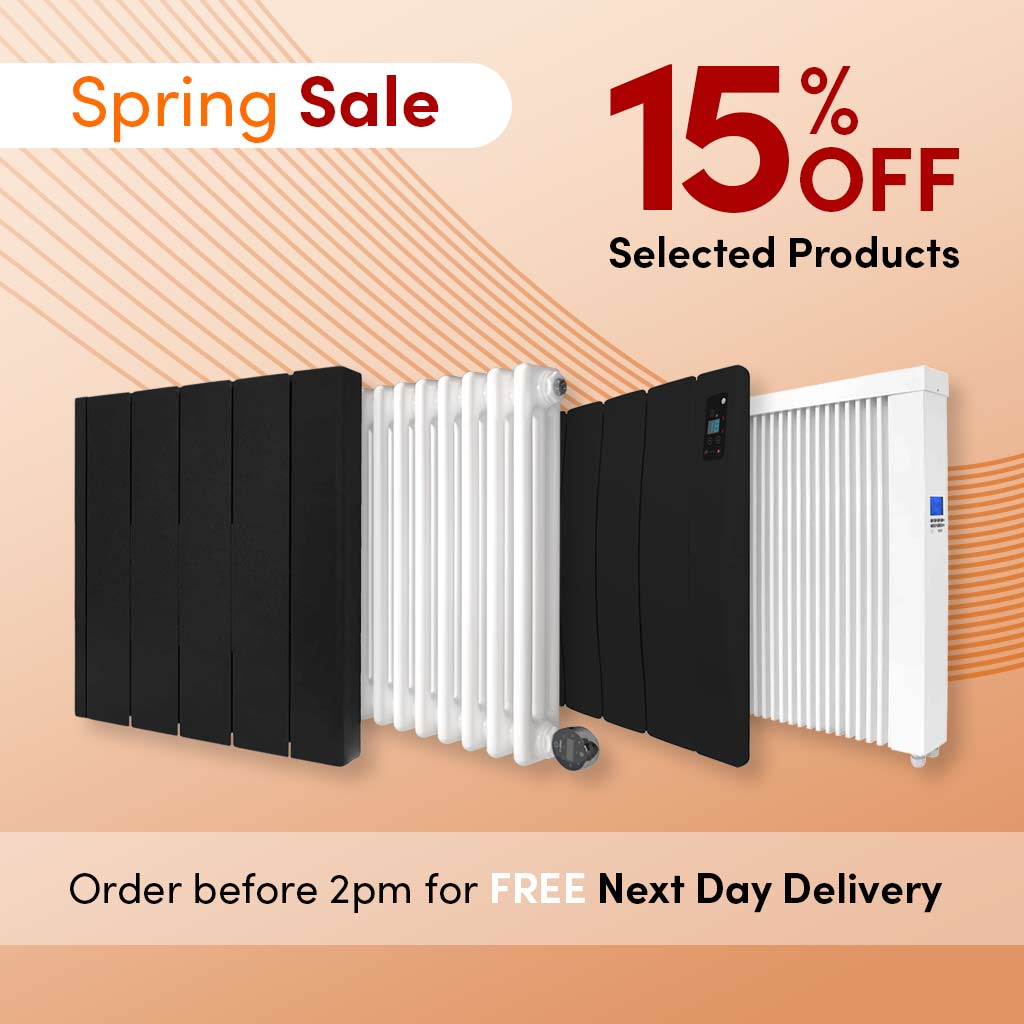What are electric heaters?
Over time, the term ‘electric heater’ has become more associated with convection-based products such as fan and panel heaters, but in reality, any electrical appliance designed for space heating is an electric heater. This includes everything from radiators, storage heaters, infrared panels and patio heaters. A modern electric heater will be designed for optimum efficiency, offering 24/7 programming and automatic energy-saving features to minimise running costs. For total heat management in the palm of your hand, some models also come with cutting-edge WiFi heating control, so you can adjust your heating on the move from anywhere in the world.
The benefits of electric heaters
-
Mix & Match Heating
The versatility of electric allows you to choose different heating solutions for each room in the home. Pick and choose your electric heater to complement how you use each space.
-
Quick & Easy DIY Installation
Suitable for DIY installation, your new electric heater can be up and running in minutes. No professional callouts required.
-
100% Efficiency
All electric heaters are 100% efficient at point of use, which means that all of the electricity they use is converted into usable heat that will keep your spaces warm and cosy.
-
Maintenance Free & Safe
Electric heaters require no ongoing professional maintenance and produce no carbon monoxide. They're energy efficient and emission free when paired with a renewable energy source or tariff.
-
Accurate Temperature Control
An electric heater with thermostat ensures spaces are kept warm using minimal energy. Accurate to within a fraction of a degree, they switch off as soon as comfort temperatures are reached.
-
Lot 20 Compliant
Our electric heaters have integrated features or external thermostats for fully Lot 20 compliant heating that adheres to EU efficiency regulations.
Which is the cheapest electric heater to run?
If you’re looking for an economical electric heater, infrared panels and storage heaters often make the best choice, however they work in very different ways. Infrared panels have lower wattages because they use radiant heat, which is absorbed and retained by the fabric of your home, making it a system much less prone to heat loss. As these low-energy heaters don’t have to work as hard to maintain temperatures, they’re an exceptionally efficient heating solution, especially when paired with a programmable thermostat. Storage heaters can also have lower running costs because they are designed to work with economy electrical tariffs which offer cheaper night time rates. By accumulating heat overnight using these cheaper rates, storage heaters provide a ready source of warmth throughout the day so you can avoid having to use the inflated daytime rates of an Economy 7 tariff. Storage heaters use convection to produce heat, which is more prone to heat loss through draughts, however, they remain the only heating solution that can effectively make use of economy tariffs. If you’re not sure what heating system is best for your home, give our Sales team a call who will be able to provide further advice and create a free, no-obligation quote.
Which is better convection or radiant heat?
Convection and radiation are both ways of heating and each comes with its own distinct benefits. Convection involves warming the surrounding air and it's commonly used by electric heaters. The biggest benefit of convection is that it produces quick results, and as it only relies on heating the air, your room can be any shape or layout and it will still be effectively heated. Its main drawback is that convected heat is quite prone to heat loss. Open doors, windows and poor insulation allow heated air to escape quickly, forcing your heating system to work harder to compensate. Radiant heat doesn’t have this problem because it travels through the air until it’s absorbed by a person, object or surface. It’s far less susceptible to heat loss, but as it requires heating the fabric of your property rather than the air volume, it takes longer for rooms to reach comfort temperatures. Infrared requires a line of sight to the areas you want to keep warm to be most effective so radiant heaters need more careful placement. Neither form of heat is ‘better’ and you may even find that you prefer a combination of the two to achieve the most comfortable sensation of warmth.
Is an electric heater safe to leave on overnight?
Wall mounted electric heaters are perfectly safe to leave on overnight because there’s no chance of them being knocked over while in operation. A wall-mounted electric heater, once firmly attached, can be left to run on their normal heating schedule all day and all night to provide comfortable heating for your whole home. Portable heaters, on the other hand, should never be left unattended because they can be knocked over by children or pets, which can cause a hazard if hot components come into contact with flammable material. If you are using a portable electric heater for home or business, always make sure to turn it off when it’s no longer in use and keep it positioned well away from curtains, drapes or any other objects which could inhibit its use.
Energy-efficient heating
-
Programmable Heating to Fit Your Lifestyle
An electric heater with a thermostat can be programmed so that your home heating perfectly matches your household schedule, ensuring no heat or energy is wasted.
-
WiFi Controllable Options
Look for our WiFi controllable electric room heaters for easy heat management on the go using a smartphone or tablet. A must for modern homes.
-
Energy Saving Features
Our electric heaters for sale come with extra automatic features like open window detection and adaptive start to help you save energy.








